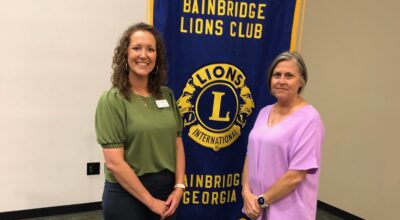Legislators discuss rural Georgia’s future
Published 7:32 pm Tuesday, December 19, 2017
Georgia Senator Dean Burke and Representative Jay Powell gave an update on the state legislature’s goals for improving the health of rural communities at a Chamber of Commerce luncheon Monday.
Burke explained a few of the main areas he and other legislators around the state are focusing on in 2018, namely healthcare, economic development and workforce development.
“My understanding from talking to a lot of the local leaders is there are a lot of jobs in Decatur County right now that are going unfilled because we don’t have a qualified workforce to do them,” Burke said. “A lot of them are just technical type skills, they (don’t require) advanced masters and doctorates degrees.”
Because of that, he expressed excitement over the recent consolidation of Bainbridge State Collage and ABAC with Southern Regional Technical College out of Thomasville. Giving students the skills to handle the technical-based jobs in our region is a huge benefit to the overall health of Bainbridge.
With a developed workforce comes more businesses, factories and jobs, Burke added. But it’s just one piece of a bigger puzzle.
“You have to have a good workforce, education system, transportation system, infrastructure including broadband,” Powell said. “You have to have medical care and access to medical care and you have to have the technology system to support what you are doing. A lot of times we just don’t have that in Georgia.”
Nationwide, 21 percent of rural communities are distressed. In Georgia alone, that number jumps to 50 percent, Powell said.
“In a lot of counties in Georgia, death rate is outpacing the birth rate because of the outward migration,” Powell added. “We are losing the best and brightest because they are going to the bright lights of the city.”
There is no silver bullet to solve this problem, either. If you improve one area, the others are still left out or fall short. Some rural communities would have to provide everything at once to look attractive to businesses, which isn’t always realistic. Even then, there is still the traditional routine of going to Atlanta and asking for prospects, Powell said.
To help, the Georgia Legislature passed a bill last term that created a special committee to analyze and solve the shortcomings of rural Georgia. Other bills have been passed that help revitalize rural downtowns or provide tax credit incentives for movie and music makers that work in rural areas around Georgia.
In healthcare, Bainbridge Memorial Hospital has managed to stay afloat by working with the City of Bainbridge and Decatur County, but other rural hospitals haven’t been so fortunate. In the past seven years, eight rural hospitals have closed, Burke said. Of the 65 rural hospitals identified in Georgia, 90 percent of them are considered at risk of closing.
“From an economic development standpoint, if you lose your hospital, it’s very hard to recruit industry,” Burke said. “It has been gratifying to see locally the city and county come together to support the hospital. I am optimistic that situation is going to become more stable.”





